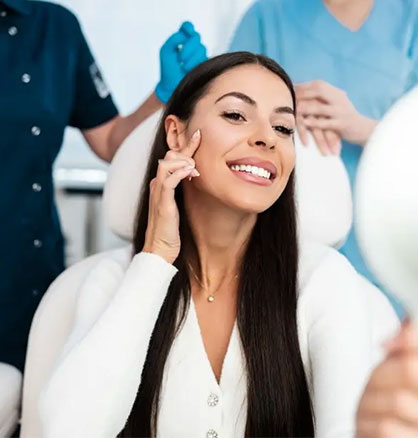- HOME
- ABOUT
- TREATMENTS
- BEFORE AND AFTER
- FAQs
- BLOG
- BOOK AN APPOINTMENT
- CONTACT
Dark spots on the face—also known as hyperpigmentation—are a common concern for many people, especially those with Indian skin tones. Whether they appear due to sun exposure, acne scars, aging, or hormonal changes, these stubborn patches of pigmentation can be frustrating to deal with.
At Skinology+ Clinic, Chandigarh, we frequently treat patients struggling with dark spots, melasma, and uneven skin tone. The good news? With the right knowledge and skincare approach, these pigmentation issues can be effectively managed.
In this blog, we’ll explain the main causes of dark spots, how to prevent them, and the best treatments to restore clear, glowing skin.

Dark spots occur when melanin (the pigment responsible for skin color) is produced in excess. This can be triggered by various factors, leading to uneven patches or spots on the skin.
How it Happens: The1 cause of dark spots is excessive sun exposure. When your skin is exposed to ultraviolet (UV) rays, it produces more melanin as a defense mechanism. Over time, this leads to sunspots (solar lentigines) and tanning-related pigmentation.
How it Happens: If you've ever noticed dark spots left behind after a pimple, injury, or skin irritation, you’ve experienced post-inflammatory hyperpigmentation (PIH). Indian skin is more prone to PIH because melanin production increases after inflammation.
How it Happens: Melasma appears as brown or gray patches, often on the cheeks, forehead, and upper lip. It is triggered by hormonal changes due to:
Melasma is more common in women and worsens with sun exposure.
How it Happens: As we age, sun damage accumulates, leading to brown spots known as age spots or liver spots. These usually appear on sun-exposed areas like the face, hands, and neck.
How it Happens: Some people are genetically prone to pigmentation issues. Indian and darker skin tones naturally have higher melanin production, which means they are more likely to develop hyperpigmentation from sun exposure, acne, and inflammation.
If home remedies and over-the-counter products aren’t enough, consider dermatologist-approved treatments at Skinology+ Clinic:
Dark spots don’t have to be permanent! With the right skincare routine, sun protection, and dermatologist-recommended treatments, you can achieve brighter, clearer skin.
At Skinology+ Clinic, Chandigarh, we offer personalized skin consultations and advanced pigmentation treatments to help you regain your natural glow.
Book an appointment today to start your journey to spotless skin!
Say goodbye to dark spots & hello to radiant skin!
Please fill up the Form below so that we can get
in touch with you at the earliest.

Call us:
+91-90416-25252
Visit Clinic:
Skinology+ (Skin, Hair, Laser & Anti-aging Clinic) by Dr Sheenam
SCO 1130-1131, Sector 22-B
Chandigarh
Email:
drsheenamskinclinic@gmail.com